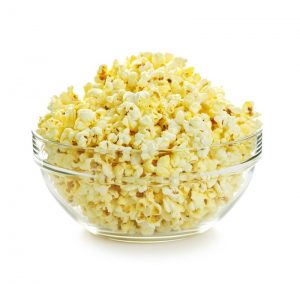If you’ve been following the health news over this past week, you’ve heard two conflicting messages about the humble, quintessentially American snack, popcorn.
It’s a conflict straight out of a superhero flick: Yesterday, popcorn was a caloric villain  determined to wreak havoc on our innocent waistlines. Today, it’s a nutritional champion, valiantly defending our bodies from damage.
determined to wreak havoc on our innocent waistlines. Today, it’s a nutritional champion, valiantly defending our bodies from damage.
So which is it?
Earlier this month, in a bid to urge lawmakers to require movie theaters to list calorie counts on menu boards, the Center for Science in the Public Interest (CSPI) launched an awareness campaign. In its materials, such as this video, CSPI singled out one alarming data point: A medium popcorn without added butter from Regal Cinemas weighs in at an astonishing 1200 calories. That’s the equivalent of four fast-food cheesburgers and 5 slices of Papa John’s pepperoni pizza.
But then, yesterday, at the annual meeting of the American Chemical Society, researchers presented as-yet-unpublished findings about popcorn’s antioxidant content. They found that popcorn contains more naturally occurring, cancer-fighting plant chemicals called polyphenols than do fruit and vegetables. In fruits and vegetables, which contain lots of water (as much as 90 percent), the polyphenol content is diluted. In popcorn which is by its very nature dried out (its water content can be as low as 4 percent) the polyphenols are concentrated.
Joe Vinson, PhD, of the University of Scranton presented the findings, and made quite a pitch for popcorn. In the press release, he says:
Popcorn may be the perfect snack food. It’s the only snack that is 100 percent unprocessed whole grain. All other grains are processed and diluted with other ingredients, and although cereals are called “whole grain,” this simply means that over 51 percent of the weight of the product is whole grain. One serving of popcorn will provide more than 70 percent of the daily intake of whole grain.
Of course, Vinson stressed that popcorn isn’t “better” than fruits and vegetables, which are packed with many different phytochemicals that offer health benefits. He’s also careful to note that the popcorn you get at movie theaters comes with a heavy caloric payload — and that many microwave versions aren’t much better.
So popcorn remains the sensible snack it’s always been — provided you pop it yourself. If you’re looking to save on calories, keep off excess pounds and control your cancer risk, use an air popper, and season with tasty spices like cumin, curry powder, paprika or garlic powder.
If you have healthy popcorn recipes, share.





